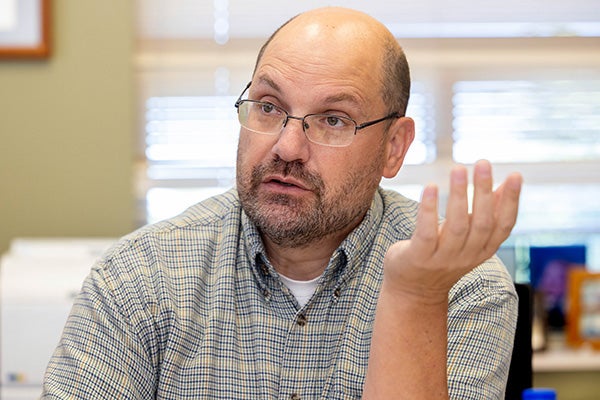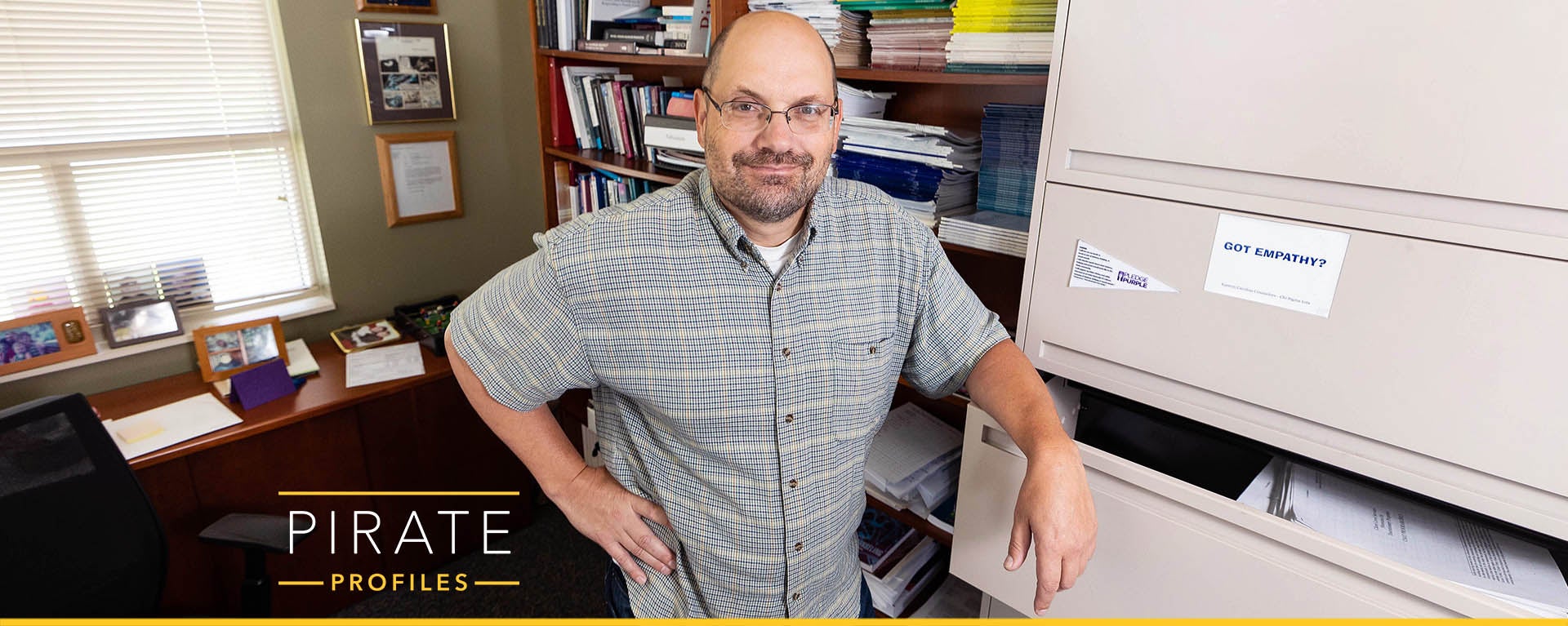Faculty: Paul Toriello
Dr. Paul Toriello believes almost dying saved his life.
Long before he arrived at East Carolina University’s Department of Addictions and Rehabilitation Studies, Toriello jumped out of a second-story window, breaking bones in his neck.
“It changed my life,” he said.
He knew he needed helped for his substance use problem.
“I went to treatment and it stuck, and I decided not to use drugs anymore,” he said. “That changed my thinking, changed my behaviors and changed my values. Eventually in college, I decided I wanted to help people the way I had been helped.”
That was in 1989, and now Toriello is chair of the department that trains mental health and addiction counselors in ECU’s College of Allied Health Sciences.

Dr. Paul Toriello, professor and chair of the Department of Addictions and Rehabilitation Studies, has been at ECU since 2005.
“It’s probably cliché but it’s true: I’m standing on the shoulders of giants. The faculty who mentored me, I owe them a lot,” Toriello said.
While working on his master’s degree, Toriello said he became interested in research, and that continued through his doctoral program at Southern Illinois University at Carbondale.
“I just emersed myself in different ways of thinking about counseling and how people change,” he said. “I wrote papers about controversial topics, and it just led me to falling in love with academics and research and the innovation of counseling.”
After working for two years in the field, he took a job at Louisiana State University in New Orleans. After a few years, he learned ECU was starting a doctoral program in counselor preparation and research, something LSU didn’t have. He left New Orleans — just two months before Hurricane Katrina in 2005 — and arrived at ECU.
“The doctoral program attracted me here, by and large, and the rural environment,” he said. “It’s a different environment than the big city of New Orleans. I dreamt of serving a community and doing research in a community and having an impact.”
While at ECU, Toriello has focused some of his research on the counselor-client relationship, a key to client behavior change.
“As a counselor — and I tell this to my students — if you can’t build a relationship with your client, you shouldn’t be a counselor because that therapeutic relationship — that bond, that rapport — has stood the test of time in being probably the strongest predictor of behavior change in the client,” he said. “I would bet you a bag of sour Skittles that there isn’t a research study of an effective counseling approach that doesn’t have some sort of relational component to it. It’s indispensable. I can go on and on with superlatives, but the relationship is absolutely indispensable when it comes to health behavior change.”
He said the tools to measure that relationship have always been subjective surveys that simply ask clients and counselors to respond to questions. He believes change is coming as technology allows for increased use of neuroscience and psychophysiological methods to measure the therapeutic relationship. Using such things as heart rate monitors during sessions could give researchers important data that can improve client outcomes.
“Science is limited by its ability to measure, so we’re limited in our ability to understand the therapeutic relationship by our ability to measure it,” Toriello said. “Neuroscience and psychophysiology are going to usher in a massive change.”
Understanding that therapeutic relationship is especially important during this period of COVID-19.
“Our suicide rate is up in this country. Our drug use rate is up. All the indicators of mental illness have increased since the pandemic. It’s alarming,” he said. “I’ve never seen anything like this.”
He said while some will seek out treatment, others may be more resistant. He said in those instances it’s important for counselors not to push clients too hard, relying on a “soft sell” rather than pressure to make them understand that when that time comes, a counselor is available.
“We’re here just to listen. We’re not here to tell you how to live your life or that you need to stop this, that or the other thing,” he said. “We’re here to help you accomplish the goals you want to accomplish.”
One tool that is available is the department’s Navigate Counseling Clinic, which offers free assessment and treatment planning, and individual and group counseling on addictions and mental health issues. ECU students, staff and faculty as well as those in the surrounding community are eligible to receive the services.
“Counseling can help,” Toriello said. “For those out there who are struggling, who are depressed or anxious, their hope is waning, reach out. Just having someone to listen can be therapeutic and can be valuable.”
When he’s not working, Toriello enjoys listening to music — he played drums in a rock band in college — playing disc golf and spending time with family. He and wife Kathy have been married 27 years, and they have two sons, Ben, 25, and Gabe, 20.
“It’s cliché, and I didn’t think I’d fall for it, but I did, head over heels: Being their father is the most important thing I’ll ever do,” he said. “If I ever struggle with work or whatever, that’s less important because I’m the father of two sons.”
FAST FACTS
Name: Dr. Paul Toriello
Title: Professor and chair of the Department of Addictions and Rehabilitation Studies
Hometown: Springfield, Ohio
Colleges attended and degrees: Wright State University, Bachelor of Arts in psychology and Master of Clinical Rehabilitation in rehabilitation counseling; Southern Illinois University, Doctor of Philosophy in rehabilitation
PIRATE PRIDE
Years working at ECU: 17
What I do at ECU: I am professor and chair of addictions and rehabilitation counseling. Basically, we train mental health, addictions and rehabilitation counseling professionals.
What I love about ECU: It’s not too big, not too small. It fits eastern North Carolina perfectly. The Greenville and surrounding communities are a joy to serve.
Research interests: Figuring out how to measure the relationship between client and counselor.
What advice do you give to students? Allow themselves to make mistakes, to remember that they determine their value.
Favorite class to teach? Fundamental counseling skills
QUICK QUIZ
What do you like to do when not working? Play disc golf.
Last thing I watched on TV: Reruns of “The Office”
First job: Working in my dad’s steel fabrication business
Guilty pleasure: Pizza
Favorite meal: Pizza
One thing most people don’t know about me: My driving can be a bit reckless.
